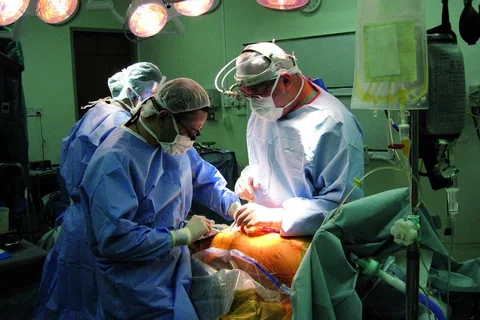UCLA awarded $11.5 million to improve organ, hand and face transplantation

Grants come from the National Institutes of Health and Department of Defense
The Dumont–UCLA Transplant Center has received two grants totaling $11.5 million from the federal government for research aimed at making donated organs last longer and helping transplant recipients live longer, healthier lives.
The grant projects — one funded by the National Institutes of Health and the other by the Department of Defense — focus specifically on improving outcomes in liver transplantation and in hand and face transplantation.
Both initiatives are led by Dr. Jerzy Kupiec-Weglinski, UCLA’s Paul I. Terasaki Professor of Surgery and vice chair of basic research in the surgery department at the David Geffen School of Medicine at UCLA.
NIH grant: Improving the quality of donated livers
A five-year, $10 million grant from the NIH’s National Institute of Allergy and Infectious Diseases will aid UCLA researchers in developing solutions to the growing challenge of “suboptimal” donated livers — organs that because of the donor’s age or pathological conditions are of inferior quality.
“This project tackles the major problem facing the field of liver transplantation — the lack of suitable donor organs to meet the growing demand for lifesaving transplants,” Kupiec-Weglinski said.
While the number of liver transplants has jumped nearly threefold over the past decade, demand has grown at nearly five times that rate, and many people die awaiting transplants because an increasing number of donated livers are unusable and must be discarded.
Researchers will be targeting ways to “rejuvenate” these livers to improve their function and make them suitable for transplantation. Their work will focus in particular on enhancing mechanisms that promote liver regeneration and healing and on mitigating factors that lead to liver transplant rejection in recipients.
The project, which will translate new findings directly to patient care settings, brings together the expertise and experience of UCLA clinician-scientists and researchers from the departments of surgery; pathology and laboratory medicine; and microbiology, immunology and molecular genetics. In addition to Kupiec-Weglinski, the team will include Kenneth Dery, Dr. Douglas Farmer, David Gjertson, Alexander Hoffman, Dr. Fady Kaldas, Elaine Reed, Rebecca Sosa and Dr. Yuan Zhai.
This latest grant represents the fourth renewal of NIH funding for liver transplant research at UCLA, which remains one of the busiest and most successful liver transplant centers in the nation. The previous five-year grant of $8.6 million expires July 31.
“This is one of only 10 federally funded program project grants devoted to organ transplantation in the U.S.,” Kupiec-Weglinski noted.
DOD grant: The microbiome in hand and face transplantation
This three-year initiative, funded by $1.5 million from the Department of Defense, will focus on the on the role of the microbiome in what are known as vascular composite allografts, or VCA — transplants, like those of the hands and face, involving multiple structures such as skin, muscles, blood vessels and nerves.
In 2011, the UCLA hand transplant program, led by Dr. Kodi Azari, became the fourth center in the U.S. to perform the procedure, and since then, experimental studies have continued to identify new ways to improve outcomes for these transplant recipients.
Yet how microbes — including the trillions of bacteria from both the transplant recipient and the donated human tissues — affect recipients’ immune system and rejection response in VCA remains largely unknown and warrants investigation, Kupiec-Weglinski said.
“There is a scientific and clinical need to develop a better appreciation of the mechanisms related to the microbiome and to build a foundation for the development of treatment protocols to reduce the risks of VCA-associated immunosuppression,” he said. “Studying microbiota in VCA is of particular interest as it involves both the known effects of the recipient’s gut microbiome as well as the skin-specific microbiome of the donor.”
With the aim of developing clinically relevant treatments, the researchers intend to study the role of microbiota in limb transplantation in mouse and pig models. Their findings, Kupiec-Weglinski hopes, will lead to new clinical treatments that reduce the detrimental side effects of immunosuppression drugs currently used in people who receive hand and face transplants.
Along with Kupiec-Weglinski and Azari, who is a professor of orthopaedic surgery and plastic surgery at the Geffen School of Medicine, the grant project, which begins Sept. 1, will include Dr. Gerald Brandacher, a professor of plastic and reconstructive surgery at Johns Hopkins University.
Original Article: UCLA awarded $11.5 million to improve organ, hand and face transplantation



